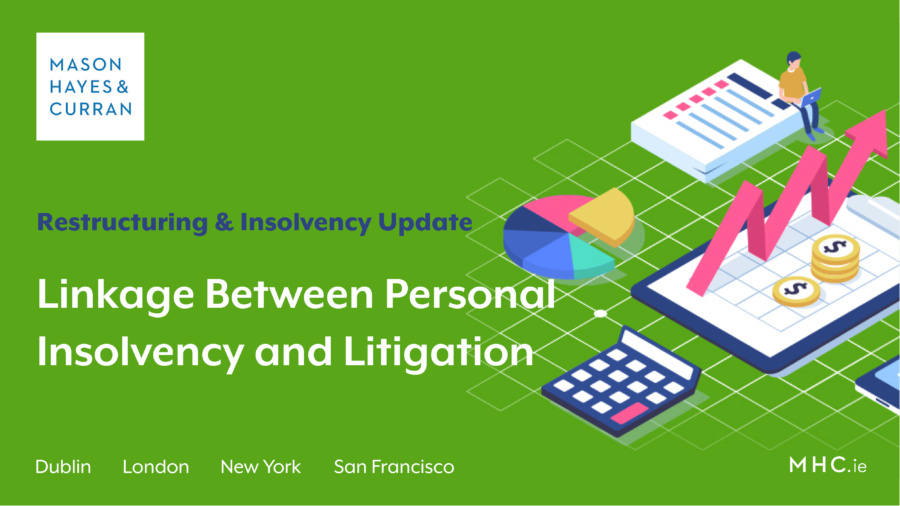
The High Court has held that disclosure of debts and undertakings given to the Circuit Court in seeking a protective certificate for a personal insolvency arrangement can be relied on in other proceedings.
Background
The McLaughlins were engaged in a long running saga of litigation with Bank of Scotland plc (“BOS”) and, after a loan sale, Ennis Property Finance Limited (“Ennis”).
In 2016 they issued High Court proceedings against Ennis and Tom Kavanagh (the “Plenary Proceedings”).
In 2019, the McLaughlins sought to avail of a personal insolvency arrangement. The solicitors for Ennis requested the McLaughlins’ personal insolvency practitioner to bring the Plenary Proceedings to the attention of the Court. Their first application to the Circuit Court for a protective certificate was refused because the Court was told that, although the debt owed to Ennis was set out in the prescribed financial statement, the debtors intended admitting that debt in the personal insolvency process but denying it in the plenary proceedings.
The solicitors for the McLaughlins then wrote to the Insolvency Service of Ireland confirming that any proceedings the McLaughlins may have issued concerning either BOS or Ennis would immediately be discontinued.
A protective certificate was then obtained on the understanding that the Plenary Proceedings would be discontinued. They were not discontinued.
The motion to strike out
The Plenary Proceedings came back before the High Court on the defendants’ motion to dismiss [2022] IEHC 286.
The statements of affairs
The McLaughlins tried to argue that the prescribed financial statements delivered in personal insolvency proceedings could not be relied on against them in the Plenary Proceedings. The Court firmly rejected that proposition:
“I do not accept that as a matter of principle that the 2012 Act was intended to establish an extra-judicial process which would be hermetically sealed from any court proceedings in respect of the same debts to the extent that reference can not be made in court to the contents of a personal insolvency application and particularly not where that material has been relied on in an application to court under the 2012 Act.”
and
“If they wished to continue to dispute their liability for the loans in issue in these proceedings, then they should not have entered into the personal insolvency process under the 2012 Act.”
The assurance to discontinue
The McLaughlins further contended that the assurance that the Plenary Proceedings would be discontinued could not be relied upon in the Plenary Proceedings. That was also firmly rejected:
“In the meantime, the plaintiffs had, and retained the benefit of, a protective certificate granted on the basis of that assurance. The existence of the protective certificate impeded the progress of … and the hearing of this motion. Although they did not achieve a resolution of their indebtedness through the personal insolvency process, they cannot now turn around and say that the assurance which they gave for the purposes of securing a Circuit Court order is one of which the High Court cannot take cognisance in these proceedings. I regard the behaviour of the plaintiffs as completely reprehensible in this regard.”
Comment
This judgment is useful in that it confirms that statements of affairs and assurances given to the Circuit Court, even in failed personal insolvency proceedings, can be relied on in other proceedings.
It is not unusual for borrowers engaged in litigation with lenders to seek to avail of personal insolvency processes and the appetite for availing of such processes has increased in recent years.
Helpfully, the Court has rejected the ability to adopt a duplicitous approach in those circumstances and it appears there is scope to have such litigation dismissed on the basis of the papers filed in the personal insolvency process where there is an acceptance or acknowledgment of the liability.
Therefore, it is important that lawyers dealing with litigation with borrowers have sight of any papers filed in relevant personal insolvency processes.
For more information, contact a member of our Restructuring & Insolvency team.
The content of this article is provided for information purposes only and does not constitute legal or other advice.







